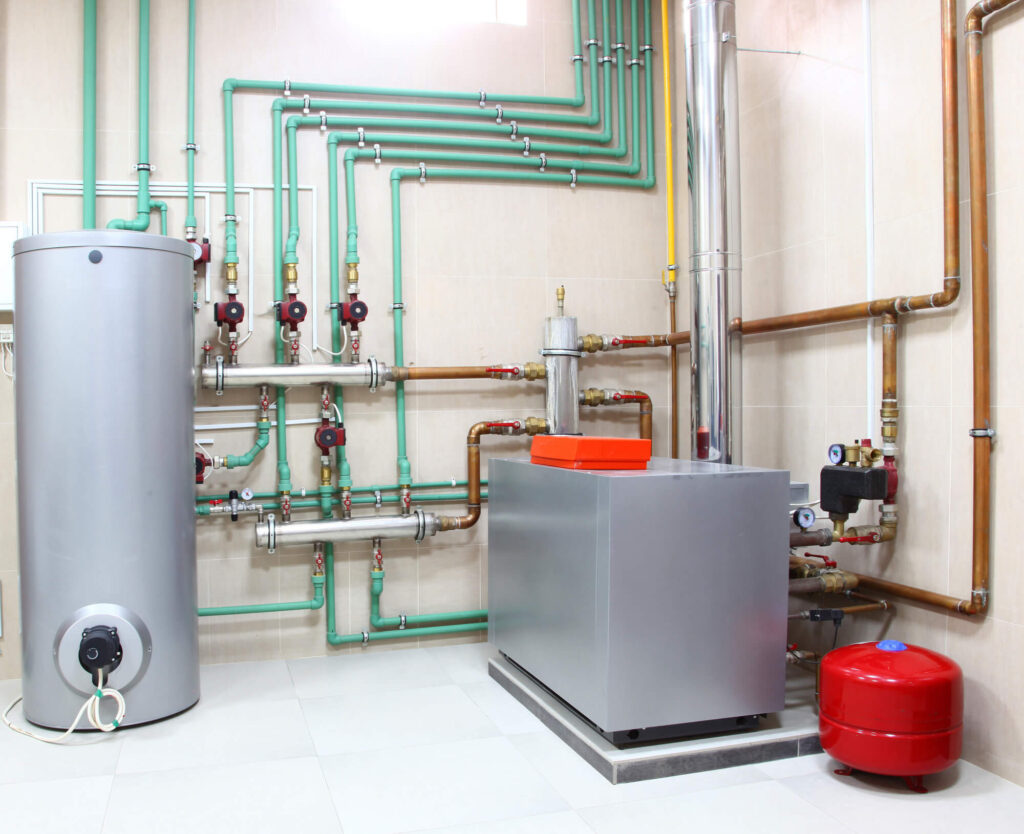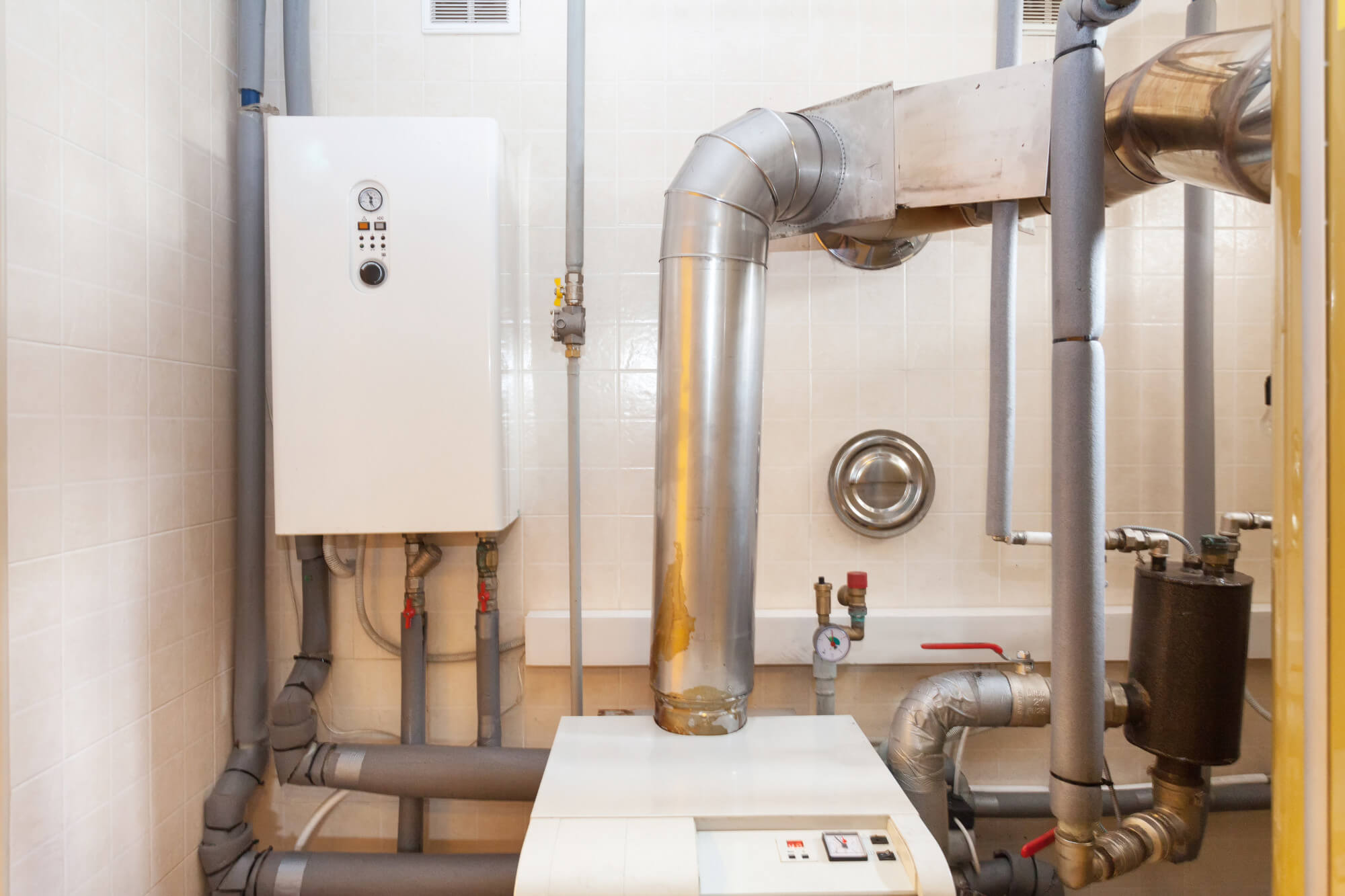When a boiler runs out of water, serious issues can arise, potentially leading to damage or dangerous situations. Without water to absorb heat, the boiler’s temperature can rapidly rise, causing metal components to overheat, warp, crack, or fail. Some boilers might also build up dangerous pressure, possibly resulting in an explosion if safety mechanisms fail, although modern models often have pressure relief valves to prevent catastrophic failure.
Heating elements like heat exchangers or coils can sustain damage without water to regulate their temperature. Many boilers have safety features that shut down the system when water levels drop critically low, mitigating extensive damage and ensuring safety.
What are the risks when a boiler lacks water?
When a boiler lacks water, it can lead to several risks and potential dangers due to the absence of water to regulate temperature and pressure.
Overheating
Without water to absorb heat, the temperature within the boiler can surge rapidly. This scenario can lead to the overheating of metal components due to the absence of a medium to regulate temperature. As a result, the internal temperature can rise to dangerous levels.
The absence of water can cause metal components within the boiler, such as pipes, tubes, or the boiler shell, to warp, crack, or even fail. Overheating of these components weakens their structural integrity, potentially leading to leaks or catastrophic failure.
Pressure Buildup

A boiler without water can experience an unchecked rise in pressure as the heating process continues. This pressure buildup poses a significant risk, potentially exceeding the boiler’s design limits and creating a hazardous situation.
In extreme cases where safety mechanisms fail or are absent, the heightened pressure within the boiler can result in an explosion. Modern boilers are equipped with safety features like pressure relief valves designed to release excess pressure and prevent such catastrophic failures.
Damage to Heating Elements:
Heating elements within the boiler, such as heat exchangers and coils, rely on water to regulate their temperature. Without proper water levels, these elements can overheat, leading to damage, corrosion, or deformation, thereby affecting the boiler’s efficiency and functionality.
The absence of water regulation can cause heating elements to malfunction, leading to decreased performance or complete failure. This can result in costly repairs or replacements of these vital components.
System Shutdown
Modern boilers are equipped with safety features that detect low water levels and initiate an automatic shutdown to prevent further operation. These safety mechanisms play a crucial role in averting extensive damage or hazardous situations.
Initiating a system shutdown in the event of low water levels is critical to prevent severe damage to the boiler and associated components. Shutting down the system ensures safety and allows for necessary inspections and repairs before resuming operation.
How to prevent boiler damage?

Implementing these mitigation and prevention measures not only addresses immediate concerns after a boiler runs out of water but also establishes protocols to minimize the likelihood of such incidents and ensures safe and efficient boiler operation in the long run.
Refilling the Boiler and Inspection
Necessary Steps After Water Depletion: Once a boiler runs out of water, the immediate action involves shutting down the system to prevent further damage. Refilling the boiler with the appropriate amount of water is essential but should be done cautiously to avoid thermal shock to the system. This involves slowly introducing water while allowing the boiler to cool down gradually.
Importance of Thorough Inspection: After refilling, conducting a comprehensive inspection is vital to identify any potential damage caused by the lack of water. Components such as the heat exchanger, pipes, valves, and other critical parts must be thoroughly examined for signs of overheating, warping, cracks, or leaks. This step helps in assessing the extent of damage and planning necessary repairs or replacements.
Regular Maintenance and Monitoring
Implementing a schedule for routine checks of water levels and boiler operations is critical. Regular monitoring ensures that water levels are maintained within safe operating limits, reducing the risk of water depletion. Monitoring should also encompass observing pressure levels, ensuring proper functioning of safety mechanisms, and detecting any anomalies promptly.
To avoid scenarios where the boiler runs out of water, preventive measures are essential. These include implementing automated systems to monitor water levels, installing alarms or sensors for low water levels, and establishing protocols for timely refilling. Additionally, conducting periodic maintenance, such as cleaning and inspecting the system, can prevent issues that might lead to water loss.
Safety Guidelines and Best Practices
Adhering to the manufacturer’s guidelines for operating the boiler is crucial for its safe and efficient use. This includes proper installation, maintenance, and operational procedures specified by the manufacturer. Deviating from these instructions can lead to operational hazards or void warranties.
Proper training and education for personnel responsible for boiler operations are indispensable. Training should cover understanding boiler systems, recognizing warning signs of water depletion or malfunction, emergency procedures, and safety protocols. Well-trained personnel can effectively operate and maintain boilers, reducing the risk of critical failures.
FAQ’s
What is a good test question?
A good test question is clear, assesses specific learning objectives, and allows for various levels of cognitive engagement.
What makes a good test?
A good test accurately evaluates the intended learning outcomes, maintains fairness, and effectively measures a student’s understanding of the material.
How do you write a test method?
Writing a test method involves outlining clear objectives, selecting appropriate question types, structuring the test layout, and considering fair assessment practices.
What is the best way to arrange items on a test?
Organizing test items should follow a logical sequence, progressing from easier to more difficult questions or grouped by related topics to facilitate a smooth flow for the test-taker.
Why are multiple-choice questions good?
Multiple-choice questions are beneficial as they efficiently assess knowledge, allow for quick grading, offer choices for answers, and can cover a wide range of topics in a single question.
What makes a good distractor?
A good distractor in multiple-choice questions should closely resemble the correct answer, be plausible to the uninformed, and effectively challenge the test-taker’s understanding of the subject matter.
Final Words
In conclusion, running a boiler without enough water can lead to serious problems like overheating, damage to parts, and even explosions. It’s super important to refill the boiler and check for any damage right away if it runs out of water. Regular checks and maintenance are key to keeping things safe and avoiding water depletion.
Always follow the manufacturer’s instructions and make sure anyone handling the boiler knows what they’re doing. By taking these steps, we can prevent accidents, save money on repairs, and keep everyone safe around boilers.

